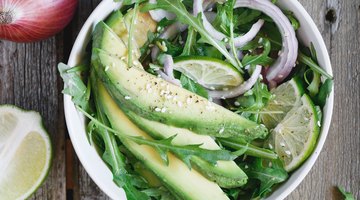A Breastfeeding Diet for Less Gas in Your Baby
Breastfeeding is the most natural way to feed a baby, and you may choose to breastfeed because of the health benefits it provides. Even though it's natural, you may still experience concerns about your baby's health. A common concern may be that your baby is gassy and you don't know what to do. If you breastfeed you can decrease gas in your baby by paying special attention to your diet.
Nomal Gas
All babies have gas. Whether they are breastfed or formula-fed, gas is normal for babies because their digestive system is still developing. Kelly Bonyata, an international board-certified lactation consultant, explains on her website that just because your baby has gas doesn't automatically mean it is due to your diet. Gas is not always a problem for babies, but if it is very frequent and persistent, it may lead you to try changing your diet.
Cruciferous Vegetables

A Diet for Breastfeeding Moms of Babies with Acid Reflux
Learn More
Jan Barger, lactation consultant for the website BabyCenter.com, states that eating cruciferous vegetables like broccoli, cauliflower and cabbage may cause gas in many breastfed babies. Though the amount of gas caused when you eat these vegetables isn't harmful to your baby, it could cause mild discomfort in the gastrointestinal tract. You may want to avoid cruciferous vegetables in favor of vegetables like celery and carrots instead. MedlinePlus.com reports that there is little evidence that cruciferous vegetables cause your infant distress. To know for sure, eliminate these foods from your diet for at least a week and see how it affects your baby.
Spicy Foods
You may be afraid to eat spicy food because you have heard that doing so will cause problems for your baby. While eating spicy foods is completely safe for breastfeeding women, BabyCenter.com explains that it may make babies gassier and possibly even fussier. Avoiding spices like cayenne and chili powder as well as spicy foods can help to reduce gas in your baby.
Dairy

Foods to Avoid When Breastfeeding Gassy Newborns
Learn More
Another common source of gas for breastfed babies is dairy in the mother's diet. Jan Barger of BabyCenter.com explains that dairy like milk, cheese, yogurt and ice cream can cause gas in babies who are breastfed when they are consumed by the mother. This doesn't occur with all breastfed babies, but some are more sensitive to lactose, a carbohydrate found in cow's milk and cow's milk products.
Treatments
The most effective treatment for reducing gas in your breastfed baby is simply waiting until his or her digestive system becomes more developed or your baby gets used to you eating particular foods, states Kelly Bonyata. In the meantime, simethicone drops can break down bubbles of gas in your baby's stomach, making your baby feel better. Drugs.com explains that simethicone drops allow all of the gas bubbles in your baby's intestines to come together easily, allowing for a smoother passage of gas through the system. Your baby's pediatrician may be able to identify other treatments for gas in the breastfed baby.










